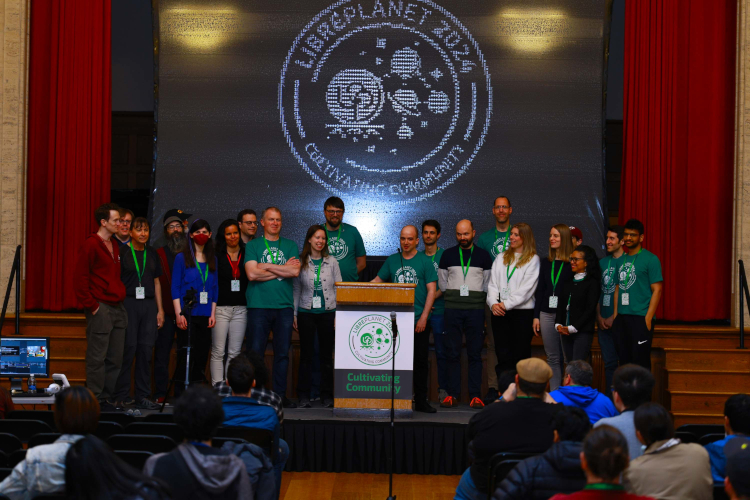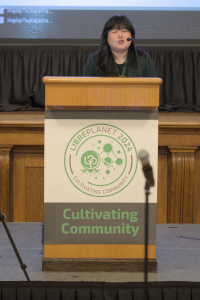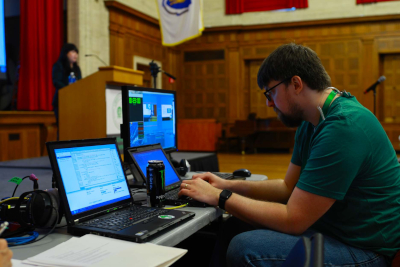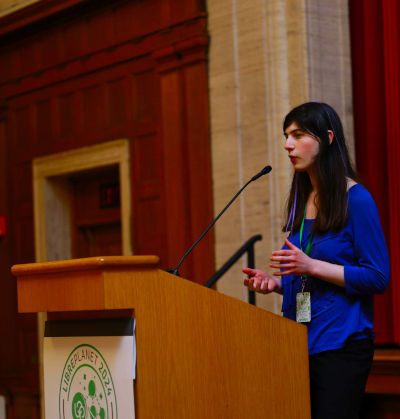
Today, May 5, marked the second day of the Free Software Foundation's(FSF) sixteenth edition of its annualLibrePlanet conference.This year's theme was "Cultivating Community." The talks andactivities this year centered around nurturing the free softwarecommunity's continued growth for decades to come. We're happy toreport that, following a successfulfirst dayof the conference,our second day brought both online and in-person attendeesentertaining and enlightening talks.

The opening keynote delivered byHayley Tsukayamashared herorigin story as an activist for user rights causes, beginning from hertime as a reporter on the Washington Post. Tired of having to pairstories about Cambridge Analytica and similar fiascos with those samecompanies' quarterly earnings, she started a journey that brought herto her work as associate director of legislative activism for the Electronic Frontier Foundation (EFF).
Tsukayama emphasized the importance of cross-disciplinary advocacy andshared lessons EFF has learned from building partnerships withdifferent movements such as the workers rights and criminal justice.When working together with other movements, attendees should thinkabout the individual skills they bring to the table and bridge theirown experience to the issues they're trying to impact. Tsukayama'stalk also emphasized the activist's journey rather than thedestination, stating that many times the cliche about "the friends youmake along the way" turns out to be true in activism for user rights.When asked by an attendee during the Q&A what individuals can do, sheencouraged all of us to write to our representatives about ourpersonal experience with free software and the injustices ofproprietary software. She says: "I often find that personal storiesmove lawmakers."
As not every conference presentation needs to be a full forty-fiveminutes, a lightning talk round was held with both in-person andprerecorded talks. The three in-personlightning talkswere givenby four conference attendees, covering topics ranging from theSandstorm platform for web development, mesh networking, and acollection of art projects that demonstrated how widespread andeffective mass surveillance technologies are. Meanwhile,J.Y.Amihudspoke on making and producing a (libre!) film with entirelyfree software, andIván Alejandro Ávalos Díazled a workshop onthe GNU Taler project which continued through the afternoon.

The free software movement extends far beyond LibrePlanet. Severalsessions in the afternoon were dedicated to spreading the message towider communities and contexts. One of these wasNeil Plotnick'spresentation on GNU/Linux in the high school classroom, where Plotnickdemonstrated how he uses free software to teach high school studentscore computer science concepts and slightly more advanced topics likeoctal (Unix) file attributes.
In theFSF staff panel, FSF executive director Zoë Kooyman joinedcampaigns team members Miriam Bastian and Greg Farough for an open(and libre!) discussion on the future of LibrePlanet, opportunities tobroaden the free software movement and the FSF's support base, as wellas challenges activists face in introducing their friends, family, andcomplete strangers to software freedom.
The lunch break had its share of extracurriculars. TheGNU Bootinstall party was continued into Sunday, where the FSF providedseveral laptops for enterprising attendees to try the sometimescomplicated flash process before performing it on their own machines.Chief GNUisanceand FSF founder Richard M. Stallman (RMS) hosteda book signing and Q&A, where attendees asked inspiring questionsabout how to build community and becoming an effective free softwareadvocate.
FSF-LA presidentAlexandre Oliva(often just "lxo") extendedCory Doctorow's useful and now well-known concept of the"enshittification" of web services to software more generally. In asession that was chock full of both knowledge and puns, Olivaillustrated software enshittification through the example of CPUmicrocode and device firmware updates, which is one of the mainavenues for the most nefarious kind of exploitation. In contrast tomore "baked-in" forms of firmware which are ethicallyindistinguishable from the circuit, microcode and firmware updates area particularly vulnerable place for software enshittification.
The volunteer-run and fully virtual Neptune track continued intoSunday, withTobias Platensharing how to game in the free worldon a Talos II,Adam Monsenhighlighting methods for "steadfast"self-hosting while streaming over the web himself,JurgenGaeremynon resurrecting the (formerly?) annual Software FreedomDay celebration, and others. LibrePlanet attendees could watch thesestreams on laptops set up in the conference's "Space Station" lobby ina special viewing session.

Alyssa Rosenzweig'skeynote concluded the conference, sharingher trailblazing work with freeing the M1 series of Apple GPUs.Rosenzweig did this through first giving an introduction to thedramatis personae of the graphical toolkit world, like Direct3D, whichshe "begrudgingly" described as a standard when compared to Apple'scompletely undocumented Metal API. From there, Rosenzweig took usthrough how she became involved in reverse-engineering graphics stacksby sharing how she freed her first machine, and her first computer, aChromebook equipped with a Mali GPU. This highlighted the dominoeffect her exemplary work on free software had, beginning with "Alyssagetting a Chromebook" leading straight up to the multi-billion dollarARM corporation contributing to the project. Rosenzweig characterizedher talk (and work) not as being about graphics or even free software,but resisting the daily injustices perpetrated by the "big corporatemonolith." "I want you to find a cause, I want you to build a community,and I want you to resist," she said. Rosenzweig concluded to a fullstanding ovation from the audience.
Rosenzweig emphasized the collective impact that our individualactions have, stating that individuals have something corporations donot: dignity. We couldn't have asked for a more appropriate capstonefor the conference generally. The free software movement continues dayto day, not just two days out of the year, and we hope thatLibrePlanet has provided the encouragement both old and new freesoftware activists need to continue their work.







